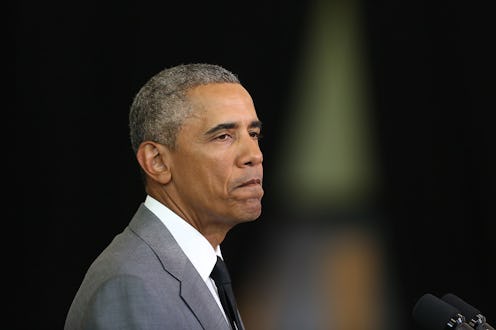News
Obama Finally Speaks Out On Racism in New Orleans
There was a marked difference between the visit President Obama made in the late afternoon to New Orleans, Louisiana on Thursday, to mark the 10th anniversary of Hurricane Katrina, and the one he made a decade ago as a senator. In 2005, when Senator Obama returned to Washington after meeting the families who had been failed by the Bush administration’s response to the hurricane, which killed more than 1,000 people and displaced nearly 400,000 more, he declared that race had nothing to do with the mismanagement of the disaster.
In fact, his exact words on the Senate floor were:
There has been a lot of attention in the media about the fact that those who were left behind in New Orleans were disproportionately poor and disproportionately African American. I have said publicly that I do not subscribe to the notion that the painfully slow response of FEMA and the Department of Homeland Security was somehow racially based. I do not agree with that. I think the ineptitude was colorblind.
However, 10 years later, beating around the bush on racial and structural inequality is hardly an option. The issue not only grips New Orleans, but has instigated multiple tragedies across the country, such as the Charleston shooting earlier this year, the unrest in Ferguson, and the rise in police brutality against people of color, which went from an annual range of between 327 and 426 deaths around 2009 to 461 in 2013. The president, who usually exercises restraint when it comes to addressing issues involving race, called a spade a spade in his speech on Thursday:
What started out as a natural disaster became a man-made one — a failure of government to look out for its own citizens.
The speech was delivered at the Lower Ninth Ward, a predominantly African American neighborhood that was one of the hardest-hit parts of the city. Obama also addressed the social and structural disparities that plagued New Orleans even before the storm, and which were made worse by the poor federal response to the disaster:
New Orleans had long been plagued by structural inequality that left too many people, especially poor people of color, without good jobs or affordable health care or decent housing. Too many kids grew up surrounded by violent crime, cycling through substandard schools where few had a shot to break out of poverty.
The president’s recognition of the role of racism in the tragedy might not only help heal old wounds, but also force other politicians and citizens at large to acknowledge another bitter truth: Racism in America is far from over. According to a ProPublica analysis of federally-collected data on fatal police shootings, black teens are 21 times more likely to be shot by a cop than their white counterparts. And a group of researchers at the University of Pennsylvania concluded that names which sounded like they belonged to minorities and/or women were 25 percent less likely to hear back from college professors regarding mentoring and work requests, as compared to white-sounding male names.
Additionally, an extensive study of the data on the renting site Airbnb by two Harvard Business School professors showed that white hosts were able to charge 12 percent more than black hosts for near-identical rooms in practically the same location. And research conducted at the University of Toronto-Scarborough and the University of Milano-Bicocca shows that people, including medical personnel, assume black people feel less pain than white people.
Despite such deep-rooted racism, America's general response to the problem is no better than that of a toddler who believes that the monsters under his bed will go away if he keeps his eyes closed long enough. At a time like this, President Obama's decision to tackle the monster by its ugly head and speak out about the problem openly in New Orleans on Thursday should be lauded and welcomed.
